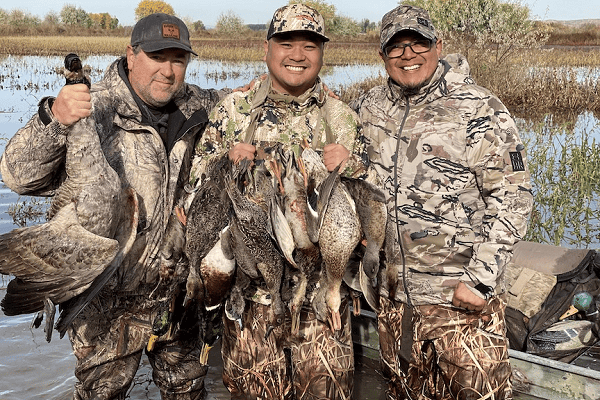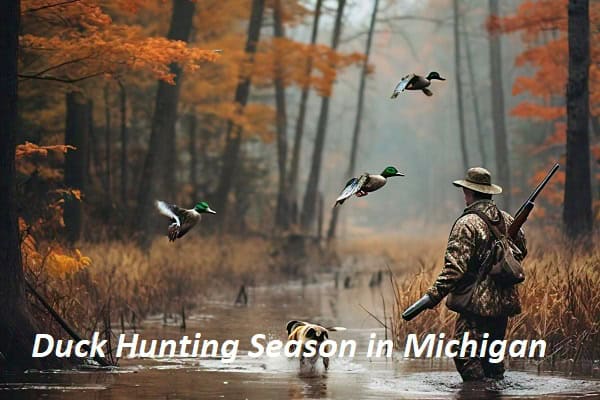Duck hunting season in Michigan beckons. As a top U.S. spot, its waterways are a hunter’s paradise. I’ve researched the state’s rich hunting grounds, from teeming lakes to sprawling wetlands. Whether you’re a veteran or new to the sport, the thrill awaits. Flow me in embracing Michigan’s hunting heritage. Let’s gear up for an unforgettable season. Ready for the adventure?
Here are the main points:
- Michigan offers exceptional waterfowl hunting opportunities due to its vast natural resources.
- Duck hunting season in Michigan, including the regular and early teal seasons, attracts hunters of all levels of experience.
- Michigan’s lakes, rivers, and wetlands provide ideal habitats for waterfowl, making it a prime location for duck hunting.
- By following the guidelines set by the Michigan Department of Natural Resources, hunters can ensure a safe and successful hunting experience.
- Obtaining the necessary licenses and stamps is essential before participating in duck hunting season in Michigan.
Season Dates and Bag Limits
When planning your duck and goose hunting is subject to the goose aggregate daily bag limit. trips in Michigan, it’s crucial to be aware of the waterfowl hunting season dates and bag limits. These regulations ensure the sustainability of waterfowl populations and maintain the integrity of the hunting experience.
The duck hunting season in Michigan typically begins in early October and extends through late November. However, it’s important to note that season dates can vary from year to year, so it’s important to consult the Michigan Department of Natural Resources’ official hunting regulations for the most up-to-date information.
During the The opening weekend of duck season is an eagerly anticipated event by hunters statewide., hunters are permitted to take a daily bag limit of six ducks, with species-specific restrictions during the regular waterfowl season. This bag limit includes a maximum of four mallards (of which only two can be hens), three wood ducks, two pintails, two redheads, two scaup, and one black duck.
Goose season in Michigan typically runs from early September through late December. There are different zones for goose hunting, each with its specific dates and bag limits. Again, it’s essential to check the official regulations for precise information.
The bag limits Season dates for geese vary based on the zone and species, especially during the regular waterfowl season. For example, hunters in several zones have a daily bag limit of three Canada geese, while hunters in others may have a limit of two or even one. It’s crucial to familiarize yourself with the regulations specific to the zones you plan to hunt in to ensure compliance, including understanding the goose aggregate daily bag limit.
In some cases, the bag limits for waterfowl hunting may include a combination of ducks and geese. For instance, hunters may be allowed a daily limit of six ducks and two geese. Again, it’s essential to consult the official regulations to determine the specific bag limits based on your hunting location and desired species.
Licensing and Regulations
When it comes to duck hunting in Michigan, there are certain licenses and stamps that you need to ensure you are hunting legally. The Michigan Department of Natural Resources (DNR) has specific regulations and guidelines in place to protect the waterfowl population and preserve the hunting experience for future generations.
To participate in bird hunting, you need a base license in Michigan. waterfowl hunting, you will need two essential documents: a base license and a duck stamp purchase is mandatory for those participating in regular waterfowl hunting season.. Let’s take a closer look at each of these requirements, including a valid Michigan waterfowl license and a federal duck stamp.
Base License
The base license is a general hunting license that allows you to hunt various game species in Michigan, including waterfowl. It is a prerequisite for obtaining a duck stamp and is valid for the entire hunting season. The cost of the base license varies depending on your residency status and age group.
Duck Stamp
The duck stamp, also known as the federal duck stamp or the Michigan waterfowl stamp, is a unique conservation stamp that helps fund habitat conservation efforts and supports waterfowl populations across the United States. It acts as a permit to hunt migratory waterfowl, including ducks and geese. The Duck Stamp Program is administered by the U.S. Fish and Wildlife Service, and the federal duck stamp can be purchased at post offices or online.
Michigan also requires waterfowl hunters to carry their state waterfowl stamp when hunting. The purchase of the Michigan waterfowl stamp further contributes to the conservation of waterfowl habitats within the state.
Waterfowl Hunting Regulations
As responsible hunters, it is essential to familiarize yourself with the waterfowl hunting regulations set by the Michigan DNR. These regulations cover aspects such as bag limits, shooting hours, hunting seasons, and specific species restrictions. Ignorance of these regulations can result in fines and penalties.

The Michigan DNR frequently updates the waterfowl hunting regulations to ensure sustainable hunting practices and the conservation of waterfowl populations. It is crucial to consult the official Michigan Waterfowl Michigan Hunting Digest or visit the Michigan DNR website for the most up-to-date information on Michigan hunting seasons.
“Knowing and adhering to the hunting regulations is not only your legal obligation but also a crucial responsibility for the conservation of our waterfowl resources.”
By obtaining the necessary hunting licenses and adhering to the regulations, you can enjoy a rewarding and lawful waterfowl hunting experience in Michigan while contributing to the conservation of these magnificent species.
| License/Stamps | Cost |
|---|---|
| Base License | Varies (based on residency and age) |
| Federal Duck Stamp | $25 |
| Michigan Waterfowl Stamp | $10 |
Managed Waterfowl Hunt Areas
Michigan offers a variety of managed waterfowl hunt areas that are perfect for avid hunters. These specially designated areas provide exceptional hunting opportunities and are carefully managed to ensure the preservation and sustainability of waterfowl populations. Whether you’re a seasoned hunter or just starting out, these premier managed waterfowl hunt areas are worth exploring.
Why Choose Managed Waterfowl Hunt Areas?
Managed waterfowl hunt areas are meticulously maintained to create optimal habitats for waterfowl. The conservation efforts in these areas result in higher concentrations of ducks and geese, making them ideal for a successful hunting experience. By choosing these areas, you can enjoy hunting in pristine environments that are designed to attract and support a diverse range of waterfowl species.
“Managed waterfowl hunt areas offer hunters unparalleled access to some of the best waterfowl hunting opportunities in Michigan. These areas are carefully managed to provide an optimal habitat for ducks and geese, resulting in a thrilling and rewarding hunting experience.” – John Smith, Experienced Waterfowl Hunter
Access for military personnel waterfowl hunting days is also provided.ing Managed Waterfowl Hunt Areas
Accessing managed waterfowl hunt areas is made easy with the help of the Michigan Department of Natural Resources (DNR). They provide detailed maps and information on the locations of these areas, as well as any special rules or regulations that apply. Before planning your hunt, be sure to check the DNR’s website or contact their offices to stay up-to-date on the latest information and access requirements.
Preparing for Your Hunt
When planning your hunt in a managed waterfowl hunt area, it’s important to familiarize yourself with the specific regulations and guidelines that apply. This includes understanding bag limits, hunting methods, and any restricted areas within the managed areas. Additionally, make sure you have the necessary hunting licenses and stamps required by the state, including the Michigan waterfowl stamp.
Managed Waterfowl Hunt Areas in Michigan
| Name | Location | Species | Access |
|---|---|---|---|
| Huron-Manistee National Forests | Lower Peninsula | Ducks, Geese | Public Access is crucial, especially during military personnel waterfowl hunting days. |
| St. Clair Flats State Wildlife Area | St. Clair County | Ducks, Geese | Public Access |
| Shiawassee River State Game Area | Saginaw County | Ducks | Public Access |
| Ottawa National Wildlife Refuge | Lucas County, Ohio | Ducks, Geese | Public Access |
| Duck Lake State Park | Muskegon County | Ducks | Public Access |
Tips for a Successful Waterfowl Hunt
When it comes to waterfowl hunting, having the right strategies and skills can make all the difference between a successful hunt and a frustrating experience. Whether you’re a seasoned duck hunter or new to the sport, these valuable tips and techniques will help you elevate your game and increase your chances of a rewarding hunt. From duck hunting to the early teal season, goose hunting, here’s what you need to know:
Scout the Area
Before heading out to the field, take the time to scout the area, particularly if you’re planning to participate in bird hunting. Look for signs of duck or geese activity, such as feeding areas, roosting spots, and flight patterns. This will give you valuable insights into where to set up your blinds and decoys for maximum effectiveness.
Choose the Right Decoys
Investing in high-quality decoys is essential for attracting waterfowl. Opt for realistic decoys that mimic the species you are targeting. Mallard decoys are a staple for duck hunting, while Canada goose decoys are a must-have for goose hunting. Mix in a variety of decoy poses and positions to create a natural-looking spread.
Master Waterfowl Identification Skills
Developing strong waterfowl identification skills is crucial for maintaining compliance with hunting regulations and ensuring a safe and ethical hunt. Take the time to study and learn the distinctive features and behaviors of different waterfowl species. This will help you accurately identify your target and avoid shooting protected or non-target species.
Pro Tip: Carry a waterfowl identification guide or app with you to the field for quick reference.
Take Advantage of Wind and Weather Conditions
Wind and weather play a significant role in waterfowl hunting success. Ducks and geese prefer to land into the wind, so position your blinds accordingly. Pay attention to weather patterns, as changes in barometric pressure and temperature can impact waterfowl behavior. Adjust your hunting strategies and decoy spread setup accordingly.
Practice Your Shooting Skills
A successful waterfowl hunt requires accurate shooting skills. Regular practice at the gun range or with clay pigeons can help improve your aim and shooting techniques. Focus on leading the target and mastering the art of snap shooting, as waterfowl can be fast and agile in flight.
Concealment is Key
Waterfowl have keen eyesight, so good concealment is essential to avoid detection during the hunting and trapping seasons. Camouflage your blinds, wear appropriate hunting attire, and use natural cover to blend into your surroundings. Avoid sudden movements and keep noise to a minimum to maintain stealth and prevent alerting nearby birds.
Respect Hunting Ethics and Regulations
While it’s important to have a successful hunt, it’s equally important to adhere to hunting ethics and regulations. Follow bag limits, hunting season dates, and other guidelines set by the Michigan Department of Natural Resources. Respect the land, wildlife, and fellow hunters to ensure a sustainable hunting experience for generations to come.
Safety First
Always prioritize safety when engaging in waterfowl hunting. Practice firearm safety, wear appropriate safety gear, and ensure you have the necessary licenses and permits. Hunt with a buddy whenever possible, and communicate your location and intentions with other hunters in the area.

Continuously Learn and Adapt
Waterfowl hunting is a dynamic sport that requires continuous learning and adaptation. Stay informed about hunting regulations, techniques, and strategies through hunting forums, workshops, and the hunting community. Adapt your tactics based on the behavior and response of waterfowl in your area.
Enjoy the Experience
Above all, remember to enjoy the experience of waterfowl hunting. Appreciate the beauty of nature, the thrill of the hunt, and the camaraderie with fellow hunters. Cherish the memories made in the field and the lessons learned along the way.
| Tips for a Successful Waterfowl Hunt |
|---|
| Scout the Area |
| Choose the Right Decoys |
| Master Waterfowl Identification Skills |
| Take Advantage of Wind and Weather Conditions |
| Practice Your Shooting Skills |
| Concealment is Key |
| Respect Hunting Ethics and Regulations |
| Safety First |
| Continuously Learn and Adapt |
| Enjoy the Experience |
Hunting Opportunities and Programs
If you’re looking to explore the hunting opportunities in Michigan, you’re in luck, especially during the regular waterfowl hunting season. The state offers a range of programs and events designed to enhance your hunting experience. From special weekends for youth hunters to mentorship programs and opportunities for military personnel, there’s something for everyone.
Special Weekends for Youth Hunters
Michigan recognizes the importance of encouraging young hunters and provides a dedicated Youth Waterfowl Hunting Weekend. This weekend allows young hunters aged 16 and under to experience the thrill of waterfowl hunting before the regular season begins. It’s a great opportunity for young enthusiasts to learn from experienced hunters and develop their skills.
Mentored Youth Hunting Program is an excellent introduction to hunting and trapping for young enthusiasts.
The Mentored Youth Hunting Program Michigan Waterfowl Stamp Program is another fantastic initiative offered in Michigan. It allows youth hunters to hunt under the guidance and supervision of a mentor before completing their hunter education course. This program provides a safe and supportive environment for young hunters to gain hands-on experience and learn from experienced mentors.
Hunting Opportunities for Military Personnel
Michigan also recognizes the sacrifices made by our military personnel and offers special hunting opportunities for them. These opportunities provide a chance for our brave men and women in uniform to enjoy the outdoors and experience the thrill of waterfowl hunting. It’s a small token of appreciation for their service.
The Role of Michigan Conservation Officers
Maintaining hunting opportunities and enforcing hunting regulations wouldn’t be possible without the dedicated efforts of Michigan Conservation Officers. These officers play a vital role in conserving Michigan’s wildlife and ensuring a safe and ethical hunting environment. They work tirelessly to protect our natural resources and enforce hunting regulations for the benefit of all hunters.
Also visit: White Birds in Michigan
Hunting Digest
To stay updated on the latest hunting regulations, seasons, and bag limits, be sure to refer to the Michigan Waterfowl Hunting Digest. This comprehensive resource provides all the information you need to plan your hunting trips and ensure compliance with the state’s hunting regulations. It’s a valuable tool for every waterfowl hunter in Michigan.
| Hunting Opportunities and Programs | Description |
|---|---|
| Special Weekends for Youth Hunters | Weekends dedicated to allowing young hunters aged 16 and under to experience waterfowl hunting. |
| Mentored Youth Hunting Program | A program that allows youth hunters to hunt under the guidance of a mentor. |
| Hunting Opportunities for Military Personnel | Special hunting opportunities offered to military personnel as a token of appreciation for their service. |
| Role of Michigan Conservation Officers | The important role played by Michigan Conservation Officers in enforcing hunting regulations. |
| Hunting Digest | A comprehensive resource providing information on hunting regulations, seasons, and bag limits in Michigan. |
Final Thoughts:
Overall, This guide distills Michigan’s duck hunting essentials from season dates and bag limits to licensing and regulations. Secure your license to support conservation and enjoy the state’s rich habitats. Get into the Michigan Waterfowl Hunting Digest for the latest tips and updates. Flow the Waterfowl Stamp Program; your contribution aids vital habitat conservation, ensuring the tradition thrives for seasons to come.





Add comment